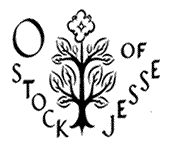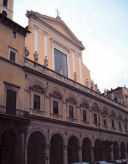» Enjoy our Liturgical Seasons series of e-books!
Today is the third of the O Antiphons. Christ the King, the Lord! Divine Wisdom, Adonai, the powerful God, is at the same time man with flesh and blood of the house of Jesse, the father of King David. Truly, the right of kingship has now passed from the house of David. The glory that once clothed the royal family has faded and withered, leaving only a blighted and withered root. But from this root is to spring a glorious blossom, the King of the world. "He shall rule from sea to sea and from the river unto the ends of the earth. Before Him the Ethiopians shall fall down and His enemies shall lick the ground. The kings of Tharsis and the islands shall offer presents: the kings of the Arabians and of Saba shall serve Him" (Ps. 71:8-11). To Him God has said, "Thou art My Son. . . . I will give Thee the Gentiles for Thy inheritance, and the utmost parts of the earth for Thy possession" (Ps. 2:7 f.).
The Fourth Sunday of Advent
‘The Lord himself will give you this sign: the virgin shall conceive, and bear a son, and shall name him Emmanuel’ (Is 7:14). This well known affirmation by the prophet Isaiah announces the coming of the Messiah into human history. It already gives us a taste of the proximity of that marvelous, stupendous day which will be the ‘dies natalis’ of Jesus. It was foretold by the prophets and proclaimed throughout the whole of Sacred Scriptures that He would be the One who would fulfil and bring them to completion. Our God will be incarnated and born due to the generous willingness of the ‘Virgin’ who, from the very beginning of time, was chosen to be the Mother of the Savior.
On the one hand we see Ahaz’s weak faith as he declined God’s concession to grant him a sign. Whilst on the other hand we see God’s insistence in giving a sign so that His dwelling place amongst men could be fully realised (cf Is 7:10-14).
‘Joseph, son of David, do not be afraid to take Mary as your wife’ (Mt 1:20). Just like in the reading from the prophet Isaiah, yet in a diametrically opposed way to Ahaz’s incredulous attitude, we see Joseph’s full adherence to God’s will. He had just decided to divorce Mary on account of her unexpected pregnancy in accordance with the Law, but upon the Angel’s reassurance ‘he did what he told him to do: he took his wife home’ (Mt 1:24). Joseph’s need for reassurance that the child was the fruit of the Holy Spirit doesn’t diminish his fatherhood but rather enhances it as ‘You must name him Jesus, because He is the One who is to save His people from their sins’ (Mt 1:21). In other words, thanks to his extraordinary fatherhood he, himself accepted and permitted the realization of God’s promise to reside amongst His people. Joseph’s great faith helps us to comprehend that faith assumes a new importance in the most intimate things that belong to us. We are reminded today that everyone of us has received our ‘apostolic mission’ to ‘obtain the obedience of faith’, and to profess our faith in Jesus Christ (cf Rm 1:1-7).
In all of these events we see the great mission that Mary undertook as a privileged instrument in the hands of God. It is thanks to her that God found His home amongst men, as she became that first resting place of the Word: ‘Today O Mary you became the book in which our rule is described. In you today is written the wisdom of the Eternal Father…. O Mary, my sweetest love, in you is written the Word, from whom we have life’s doctrine. You are the table on which that doctrine rests. I see this Word that is written in you, who is not without the holy desire of the cross. Immediately that he was delivered to you, the desire of dying for the health of men, for whom he was incarnated, was grafted and placed in Him.’1
Wake up, therefore, because the birth of the Lord is almost at hand, let us go to meet Him in His glory: to listen to him, to love Him and to follow Him!
1 St. Catherine of Siena, Prayers and Elevations
From the Congregation for the Clergy
O Root of Jesse
"Come to deliver us and tarry not." The world cries out for Christ its King, who shall cast out the prince of this world (John 12:31). The prince of this world established his power over men as a result of original sin. Even after we had been delivered from the servitude of Satan through the death of Christ on the cross, the prince of this world attempts to exercise his power over us. "The devil, as a roaring lion, goeth about seeking whom he may devour" (I Pet. 5:8). In these trying times, when faith in Christ and in God has largely disappeared, when the propaganda of a pagan culture is broadcast everywhere, and the forces of evil and falsehood rise up to cast God from His throne, who does not feel the power of the devil? Does it not appear that we are approaching that time when Satan will be released from the depths of hell to work his wonders and mislead, if possible, even the elect? (Apoc. 20:2; Matt. 24:24.)
"Come, tarry not." Observe how thoroughly the world of today has submitted to the reign of Satan. Mankind has abandoned the search for what is good and holy. Loyalty, justice, freedom, love, and mutual trust are no longer highly regarded. Establish, O God, Thy kingdom among us, a kingdom established upon truth, justice, and peace. "Come, tarry not." "Thy kingdom come."
Excerpted from The Light of the World by Benedict Baur, O.S.B.
 3rd O Antiphon:
3rd O Antiphon:
A standard to the peoples,
Before whom kings are mute,
To whom the nations will appeal,
COME
To deliver us,
Delay, please, no longer.
![]() Today is Day Four of the Christmas Novena.
Today is Day Four of the Christmas Novena.
Advent Reflection: The Light of a New Humanity
Anyone who goes through our streets in the early days of December will often meet him, Santa Claus, dressed more or less as a bishop and never without his long white beard (which has been attributed to him since at least the eighth century). What these Santa Claus figures say and do is also more or less episcopal in nature; often they are more in the role of the bogeyman than of one who makes present the love of the Holy One, that love of which the legend speaks in many variations. It is almost impossible to tell with historical precision who this man was; and yet, by listening attentively to the oldest sources, through the mists of time, we can still discern the radiance of a figure who opens up a door to Advent, who can mediate, that is, an to of Jesus Christ.
In his portrayal of the life of St. Nicholas, his most ancient biographer, a certain Archimandrite Michael, says that Nicholas received is dignity from Christ's own sublime nature just as the morning star receives its brilliance from the rising sun. Nicholas was a living imitation of Christ: "In the radiance of his virtues", says the biographer, "the sun's righteousness has dawned." Tradition has always equated Santa Claus with the Bishop Nicholas who participated in the Council of Nicaea and, together with that first great assembly of bishops, helped to formulate the affirmation of the true divinity of Jesus Christ. What was at stake here was the core of Christianity, whether Christianity was to become just another sect or something really new, faith in the Incarnation of God himself. Was Jesus of Nazareth only a great religious man, or had God himself actually become, in him, one of us? So, ultimately, the question was this: Is God so mighty that he can make himself small; is he so mighty that he can love us and really enter our lives? For if God is too far away from us to love us effectively, then human love too is only an empty promise. If God cannot love, how can man be expected to do so? In professing faith in God's Incarnation, therefore, it was ultimately a case of affirming also man's capacity to live and die in a human manner. The figure of St. Nicholas, Santa Claus, illustrates and symbolizes this connection.
Theodor Schnitzler put this very well: "In putting his signature, in faith, to the mysterium of the incarnate Son of God, a person is enabled to be a helper of his fellow men, to bring happiness to children, families and the oppressed. Faith in the Incarnation promotes the salvation of mankind and the implementation of human rights."
The oldest sources concerning St. Nicholas also point in the same direction from a different angle: Nicholas is one of the first people of to be venerated as a saint without having been a martyr. During the persecution of Christians, those who opposed the pagan state power and gave their lives for their faith had quite automatically become great examples of faith. When peace was concluded between Church and state, people needed new models. Nicholas impressed them as one ready to help others. His miracle was not that of great heroism in the face of torture, imprisonment and death. It was the miracle of constant kindness in everyday life.
Another of the legends expresses it very beautifully in this way: Whereas all the other miracles could be performed by magicians and demons, and thus were ambivalent, one miracle was absolutely transparent and could not involve any deception, namely, that of living out the faith in everyday life for an entire lifetime and maintaining charity. People in the fourth century experienced this miracle in the life of Nicholas, and all the miracle stories which accrued subsequently to the legend are only variations on this one, fundamental miracle, which Nicholas' contemporaries compared, with wonder and gratitude, to the morning star reflecting the radiance of the light of Christ. In this man they understood what faith in God's Incarnation means; in him the dogma of Nicaea had been translated into tangible terms.
The morning star which receives its light from the rising sun—this ancient description of St. Nicholas is also one of the oldest images of the meaning of Advent. If we are to be continually lighting candles of humanity, giving hope and joy to a dark world, we can only do so by lighting them from the light of God incarnate. This, at the deepest level, is the message of all Santa Claus figures: from the light of Christ we are to light the flame of a new humanity, caring for the persecuted, the poor, the little ones—this is the core of the legend of St. Nicholas.
—Joseph Cardinal Ratzinger, Seek That Which is Above

Fourth Sunday of Advent
Station with Ss. XII Apostoli or Santi Dodici Apostoli (Church of the Twelve Holy Apostles):
At Rome, the Station is in the Basilica of the Twelve Apostles, better known in Rome as better known as Santi Apostoli. We receive today a twelve-fold blessing from the apostles with whom we celebrate this last Sunday of Advent. As living stones we are built on these twelve solid and sacred foundation stones who themselves rest on the divine cornerstone, Christ. Ye holy apostles of Christ, be with us and pray for us, that with well-prepared hearts we may "go forth to meet Him, and say: Great is His dominion, and His kingdom will have no end; He is God, the Mighty, the Ruler, the Prince of Peace."
For more on Santi Dodici Apostoli, see:
For further information on the Station Churches, see The Stational Church.






